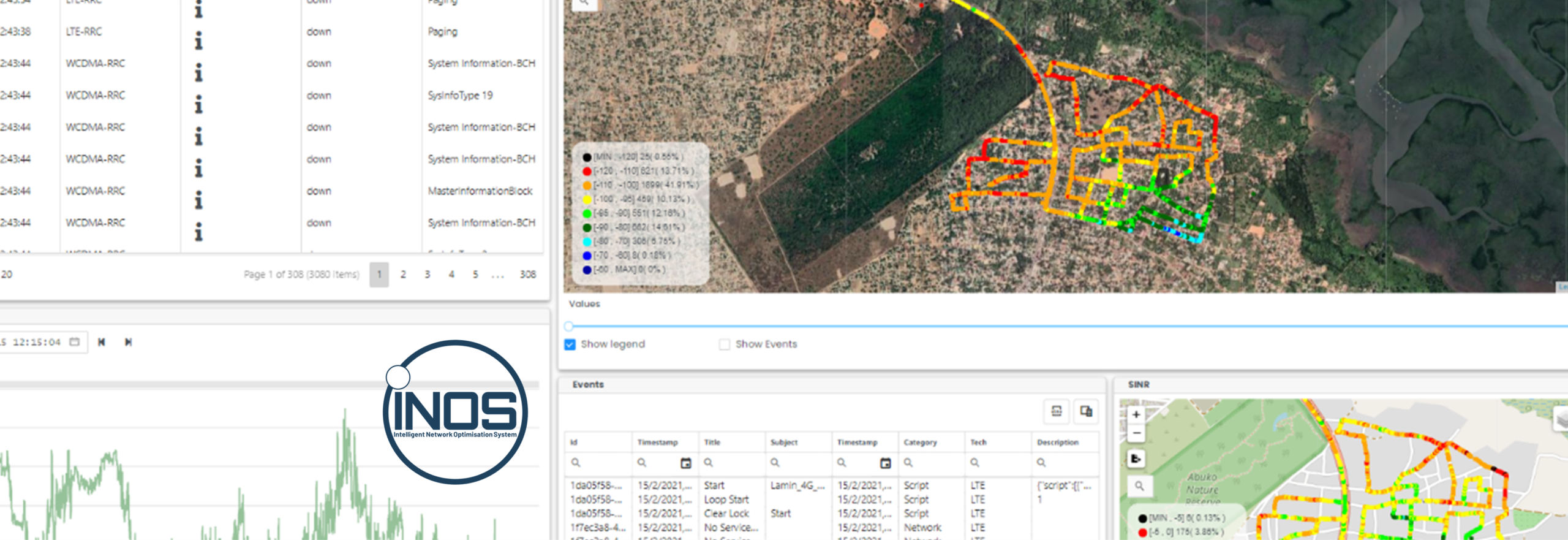Tag: network optimisation
Can you hear me now? AI-centred voice call quality testing
Can you hear me now?
In a world where mobile communication is focused on the use of apps and data, does the quality of a voice call still matter? And is it worth communications service providers (CSPs) spending effort on improving it?
In this blog post Amr Ashraf, Digis Squared’s RAN and Software Solution Architect and Trainer argues that “Yes, it absolutely is! Voice quality, and particularly silence within calls – can you still hear me? – is one of the most tangible aspects of network quality for end users.”
Read on for insights into Digis Squared’s AI-centered voice call quality testing capabilities, using INOS.

If it’s important, we call.
Does voice quality still matter? “Yes! As voice technologies continue to evolve, and call costs drop, it continues to be important to ensure that the quality and clarity of voice calls is maintained,” explains Amr Ashraf, RAN and Software Solution Architect and Trainer.
“The phone call, the most basic and original capability of the mobile phone service, is also the most tangible for end users. Despite the huge range of apps we have on our phones, more often than not, it’s a voice call that’s used for communicating the most important, most sensitive and most urgent information.”
If we can’t clearly hear and understand what is being spoken on a call, or in a voice note, whichever app or method is used to connect or send the audio, then the customer’s perception is always that the network coverage or capacity is of low quality.
“If you find yourself saying ‘Can you still hear me? Are you still there?’, or thinking ‘What did they say?’, then the assumption is that the ‘fault’ is a poor quality service from the CSP”, says Amr. “Of all the aspects of a mobile network, voice quality is the strongest and most obvious indicator to an end-user of the quality of the service. Customers’ expectations of voice quality remain high, whichever technology the digitalised sound is transmitted over.”
Voice technologies today
Today, whilst some traditional mobile voice calls are still carried over legacy circuit-switched networks, calls made over 4G and higher, and for all app-based solutions, these digitalised sounds are transmitted as Voice over IP (VoIP), Voice over LTE (VoLTE) and Voice over WiFi (VoWiFi), all of which enable cost-effective ways to transport voice. Having a single solution that can assess voice quality across all technologies, in an automated and efficient way is vital – and in the web of complex multi-system networks, that AI-centred voice call quality testing solution must also work with solutions from all vendors.
INOS
Digis Squared’s INOS AI tool is a vendor agnostic, multi-network-technology solution delivering automated assessment, testing and optimisation of networks, across all technologies.
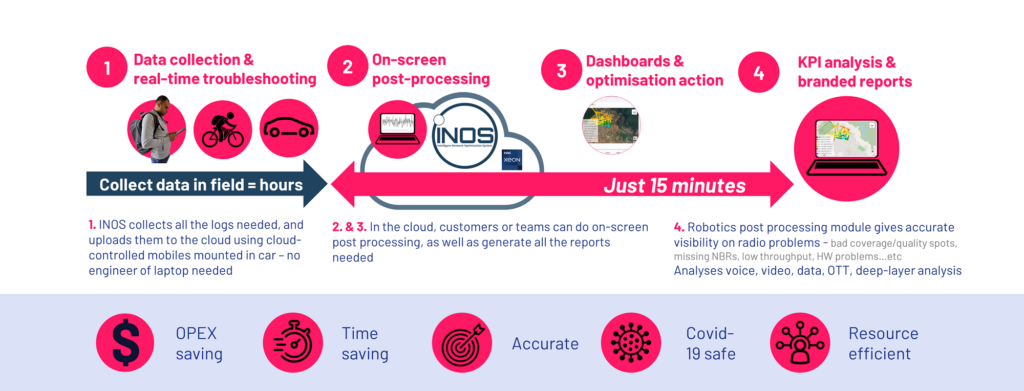
INOS & voice call quality testing
“If one of our clients – a CSP, MNO, MVNO or regulator – wants to better understand voice call quality on a specific mobile network, then we use our INOS AI tool to analyse the data,” shares Amr.
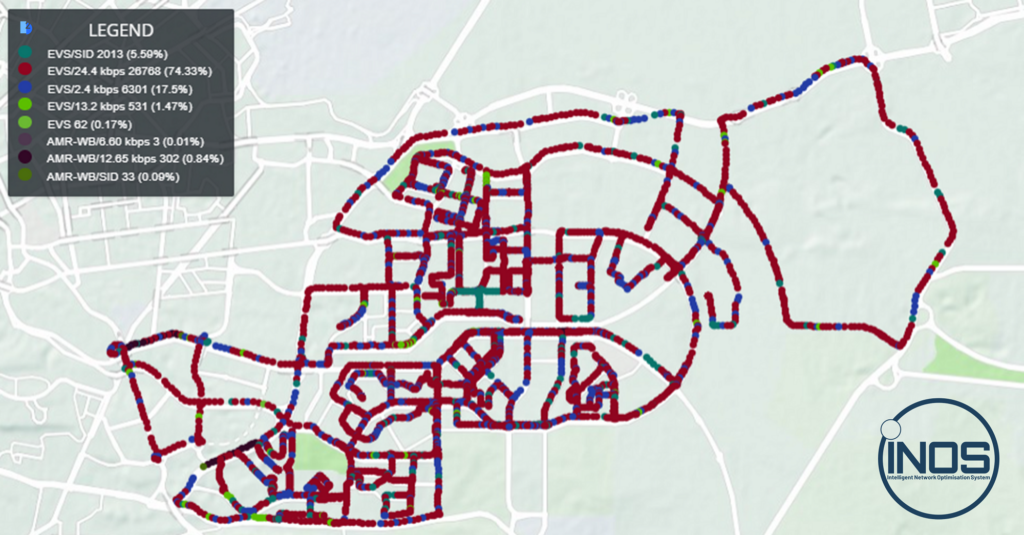
Notes on Image 1: For a voice call to be transmitted over the mobile network, it must first be digitized and compressed. Various standardized compression technologies, or codecs, are used to efficiently transmit the data. This image shows data collected during voice calls during a drive test, and the key on the left shows the codec used.
Enhanced Voice Rate (EVS) and Adaptive Multi-Rate (AMR) are audio compression formats used in the transmission of voice calls – EVS is a super-wide coding standard developed for VoLTE, and AMR is the older standard developed for GSM and UMTS (3G), sometimes called HD+.
Image 1 shows the variation in codec and compression rate utilised during test voice calls, made during a drive test. The changes in codec and compression rate are caused by changes in network coverage and capacity during the coverage, and will have resulted in fluctuations in call quality.
“Using INOS, we can simulate a customer call using the voice quality test to produce unbiased, industry-recognized audio quality scores,” explains Amr. “This test can reveal a great deal about your customers’ experience, as well as the quality of service being provided by your carrier. It also takes minimal preparation to undertake.”
Vital to this test is POLQA – Perceptual Objective Listening Quality Analysis – the global standard for benchmarking voice quality of fixed, mobile and IP-based networks. Standardized by the ITU in 2011, it is used for voice quality analysis of VoIP, HD Voice, 3G, 4G/VoLTE and 5G networks.
“So, whilst drive testing with the INOS kit, we set up a voice call and then use our own hardware solution to inject a POLQA reference audio into the voice call from one side of the call, and from the other side, we record the call, and then compare it using the POLQA algorithm.”
“Given that the POLQA reference audio is 6 seconds long, to analyse this data, we must split our call into audio files that are each only 6 seconds long. To ensure very precise splitting of the audio file, we leverage our AI engine to find the beginning of specific words in audio files. This way, we can ensure that we are aligning the analysis with natural speech patterns, and achieve a more realistic analysis of the data.”
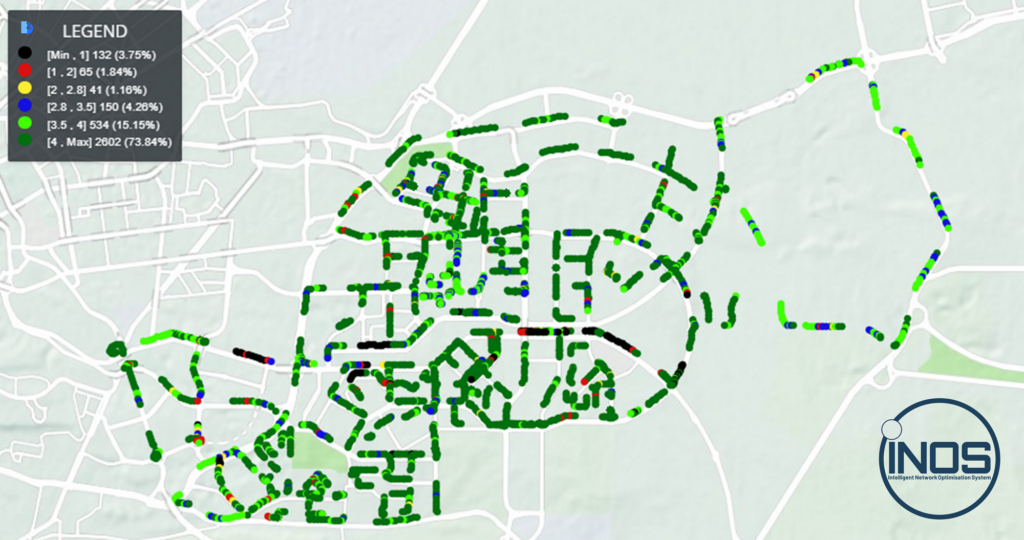
Notes on image 2: using data from the same drive test shown in image 1, now the data has been analyzed by INOS, and split into 6 second chunks, aligned with the start of specific spoken words in the audio file.
In telecoms, the Mean Opinion Score (MOS) is a numerical measure of the overall ranking of the quality of voice and video sessions. In image 2 above, we can see that on this journey, only a small minority of sections score the minimum 1 MOS (in black), and most of the call is green (MOS 3 and 4).
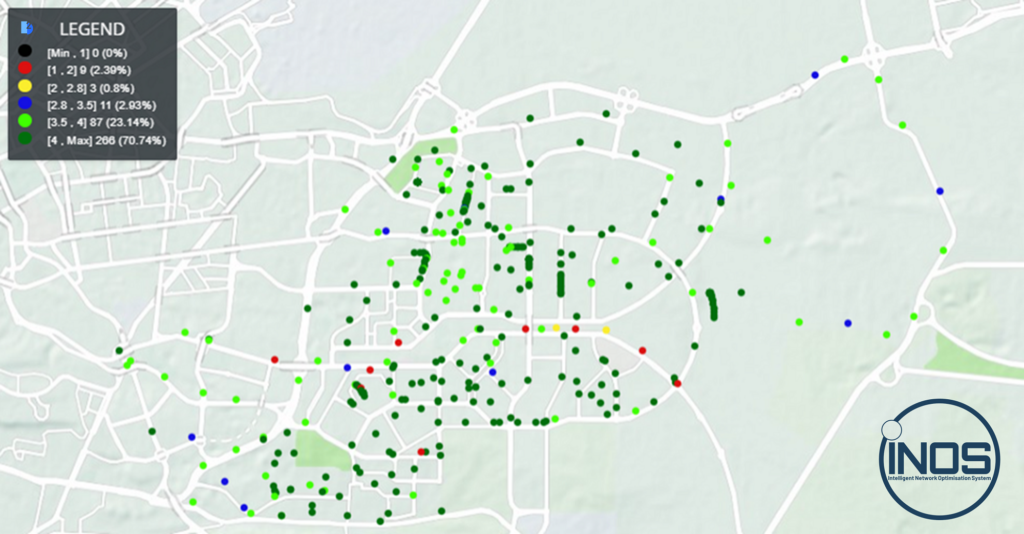
Notes on image 3: again using the same data as above, here the data is averaged out for specific calls, rather than 6 seconds chunks of a call shown in image 3.
INOS & silence within a call
“Silence within a call is a major problem with mobile phone conversations, and significantly impacts the customers’ perception of call quality. We’re all familiar with having to say ‘Can you still hear me? Are you there?’ whilst one of the people on the call is travelling in a car or bus,” continues Amr.
“To measure this, the Digis Squared team utilize our in-house AI capability within INOS to detect silence in voice calls, and analyse the percentage of silence.”
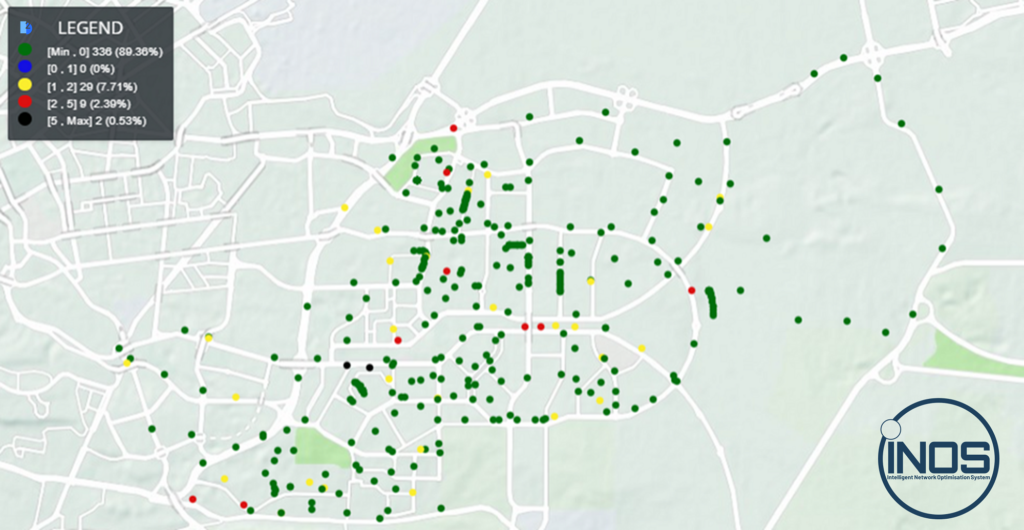
Notes on image 4: this analysis identifies areas where silence during the call was detected. Green indicates no silence, and in yellow, red and black are increasing amounts of detected silence.
INOS: automated, actionable voice call quality reports
INOS delivers automated voice quality reports, with customised KPIs, and actionable insights.
Amr concludes, “All our INOS reports can be fully customised, and are generated within 15 minutes of receipt of the data file, sent directly from the test devices in the field, over the air. What our clients find most useful is that not only are the reports conveniently formatted for immediate use, they also, thanks to our AI engine, clearly identify issues and provide actions which can be taken to address those issues. Data is no use without analysis, and the AI capabilities we have developed within INOS ensure that the analysis is fast, efficient and actionable.”
Find out more about INOS
INOS can be implemented as a public or private cloud, or on-premise solution, and is also available as a “Radio Testing as-a-service” model. Its extensive AI-analysis and remote OTA capabilities ensure speedy and accurate assessment of all aspects of network testing: SSV, in-building and drive testing, network optimisation and competitor benchmarking, across all vendors, network capabilities and technologies, including 5G, private networks and OpenRAN.
INOS is built with compute resources powered by Intel® Xeon® Scalable Processors. Digis Squared is a Partner within the Intel Network Builders ecosystem program, and a member of the Intel Partner Alliance.
In conversation with Amr Ashraf, Digis Squared’s RAN and Software Solution Architect and Trainer.
If you or your team would like to discover more about our capabilities, please get in touch: use this link or email sales@DigisSquared.com
Discover more
- Product update: “Radio Testing as a Service” – successful cloud-based INOS installation in Intel Lab
- Image credits: all images, except first, copyright Digis Squared. First image (woman on phone) Gabriel Gonzalez
About Digis Squared
Managed Services, System Integration & Consulting. We transform telecom networks, deploy new technologies, and manage vendors, for network operators, service providers and regulators. Apply our vendor-agnostic expertise, automated AI-led tools and processes to transform your technical and commercial capabilities. We work with agility, deep experience, and our in-house cognitive tools to optimise and manage multi-vendor networks across all technologies. Headquartered in the UK, Digis Squared has offices in Angola, Egypt and UAE.
Digis Squared ◦ Enabling smarter networks.
First ever mobile video call in Yemen, on 5G-ready Y-Tel network
In Yemen, even simple person-to-person 2G calls are unreliable – this first ever mobile video call, marks a colossal transformation, only 18 months after Y-Tel initiated this major transformation program with Digis Squared.
Aden, YEMEN – 15 June 2022 – Y-Tel has made the first call on in its new 5G-ready network in Yemen, and the first ever mobile video call in the country. This significant technical milestone marks the start of the leap from legacy 2G to transformed 5G-ready network operations, and heralds a new era of stable calls and mobile data for the first time for the Yemeni people.
After the war, and as part of the re-construction mega-project across the country, the Yemeni Government in Aden assigned 4G telecommunications licenses to Y-Tel. Previously, Y-Tel ran only a legacy 2G network for voice and SMS, which like all Yemeni networks suffered from very patchy coverage, and significant network instability.
Following a rigorous selection process, the entire Y-Tel network major transformation program – covering everything from the entire network planning and design, through to vendor selection, end-to-end Radio on-site rollout, network core infrastructure implementation and integration, through to network go-live, and operations – was assigned in its entirety to Digis Squared, including end-to-end Managed Services and System Integration. Working throughout the pandemic, the highly motivated teams have solved complex technical and logistical issues to transform all aspects of capability, to deliver a world-class 5G-ready network in Aden, Yemen, and in parallel managed the current 2G legacy network, to keep the limited existing capability going, and migrate the subscribers to the new secure network.
“This on schedule first call, plus first 4G data connection and first ever mobile video call in the country are significant and exciting program milestones for our client Y-Tel and the Digis Squared Team,” shared Digis Squared COO Ahmed Zein.
“The impact of this major program on the Yemeni people can not be overstated. This is a country where even person to person calls are very unreliable, where there is incredibly limited coverage and almost no mobile data, making it very difficult to keep in contact with loved ones in the country and internationally,” Zein continued. “Until you have lived and worked here it is hard to imagine or remember life without mobile connectivity. We over use the term ‘digital transformation’ in our industry; I simply cannot express the impact this project will have on the people here in Yemen. The ability to phone a loved one, to place an order with a company, to send a photo to a friend – the connectivity we are delivering will truly transform lives, and improve the functioning of society. The benefit this project will bring to the Yemeni people, starting with Aden, is colossal.”
“Digis Squared have completely replaced and upgraded the legacy infrastructure, entirely transforming the capability, stability and capacity available, and delivered every element of this network for Y-Tel”, explained Zein. “Starting from a blank piece of paper, we have handled everything from network design and architecture, vendor and equipment selection, contract management, logistics and warehousing, physical network rollout and optimization, back and front office implementation, network commissioning and dimensioning, everything through to network operations – every element from the ground up. The old legacy systems have been dramatically upgraded to best-in-class cloud-based solutions. We have worked closely with the Y-Tel team, the telecom sector in Yemen, and the Ministry of Telecommunication.”
The transformed Y-Tel network will launch initially in Aden, before a phased national deployment. These “first calls” mark the start of network operations and pave the way for a phased roll-out of infrastructure and portfolio of customer services.

“This program in Yemen is incredible. I am immensely proud of our Digis Squared team in Yemen, and our global team who have worked together to achieve this entirely transformed network infrastructure, and the milestone first calls last week,” stated Digis Squared CEO Ziad Khalil. “This first ever mobile video call in Yemen is testament to the hard work, dedication and skill of our teams. It builds on our significant achievements in launching and operating the Africell Angola network earlier this year. If we can contribute to change people’s lives for the better, and completely transform, launch and operate a 5G-ready network, if we can do this in Yemen, we can do this anywhere.”
“After working closely together with Digis Squared for the last 18 months, it was a real thrill for me to make the first video call together with Zein!,” said Ahmed Gadallah, Vice Chairman of Y-Tel. “This reliable, and fast connectivity will bring such a dramatic improvement in communications to the Yemeni people, we can’t wait to bring our new fast 4G network to the people of Aden and then across Yemen. We have a very exciting time ahead of us!”
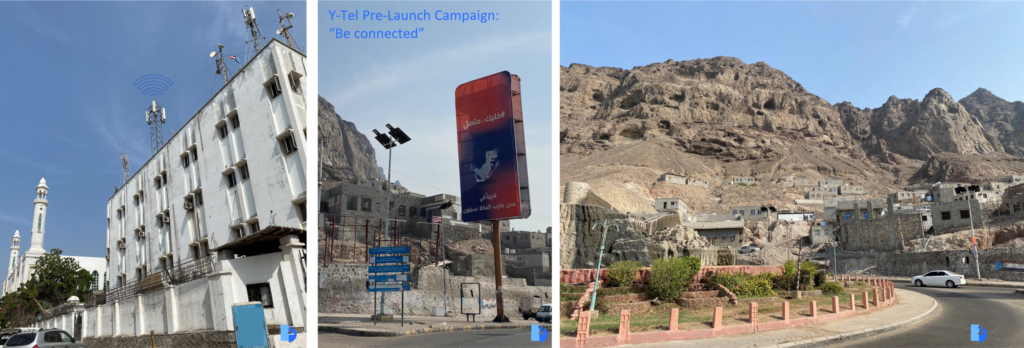
About Digis Squared
Managed Services, System Integration & Consulting. We transform telecom networks, deploy new technologies, and manage vendors, for network operators, service providers and regulators. Apply our vendor-agnostic expertise, automated AI-led tools and processes to transform your technical and commercial capabilities. We work with agility, deep experience, and our in-house cognitive tools to optimise and manage multi-vendor networks across all technologies. Headquartered in the UK, Digis Squared has offices in Angola, Egypt and UAE.
Digis Squared ◦ Enabling smarter networks.
If you or your team would like to discover more about our capabilities, please get in touch: use this link or email sales@DigisSquared.com .
Digis Squared, independent telecoms expertise.
Discover more
Further notes
- The first voice and video calls were made on the new 4G network on the 8th June 2022 in Aden, Yemen between Ahmed Gadallah, Vice Chairman of Y-Tel and Digis Squared COO Ahmed Zein.
- The transformation project included,
- Legacy 2G infrastructure transformed to 4G, with 5G-ready capability (5G license not yet available).
- The Digis Squared team managed all elements of,
- Network planning, design and architecture
- Vendor and equipment selection, contract management
- Logistics and warehousing
- Physical network rollout and optimization
- Customer registration (mobile, public internet and new number range)
- Network security
- Network core infrastructure implementation and integration
- Legacy Core and Charging systems modernized to Cloud Core Network, Cloud Charging/BSS and VAS consolidation – this will enable Y-Tel to deliver a comprehensive catalogue of commercial products and services to meet the daily needs of the Yemeni people.
- Back and front office implementation
- Network commissioning and dimensioning
- Managed Services: all elements of live network operations
- Y-Tel mobile network soft launch of 4G is scheduled for Aden very soon. In parallel, fast-paced work is underway to be ready to launch in Mukalla, Mareb and Sayoun during 2022, with further coverage extension to other provinces in 2023.
Related coverage,
- Mobile World Live: Y-Tel hails Yemen mobile data milestone
- telecompaper: Y-Tel makes first mobile video call in Yemen on 5G-ready network
Yemen: first call and first 4G video call, on a newly transformed network
Exciting news, that we can’t keep to ourselves any longer, from Aden, Yemen.
First call & first 4G video call
“We are delighted to make the first voice call, and first 4G live video call on a completely end-to-end transformed network this week!” shares COO Ahmed Zein in Aden.
“This work in Yemen is incredible,” added CEO Ziad Khalil. “The people of Yemen have been without a reliable voice and data connection for a long time, making it very difficult to keep in contact with loved ones in the country and internationally. I am very proud of the work that the Digis Squared team have achieved for Y-Tel, and this significant milestone this week.”
“This is a massive program which Digis Squared have led from the start, end to end,” shared COO Zein. “ The program includes the entire network planning and design, through to vendor selection, end-to-end Radio on-site rollout, network core infrastructure implementation and integration. We have worked closely with the Y-Tel team, and the telecom sector in Yemen, including the Ministry of Telecommunication, building every element of the network from the ground up for our client Y-Tel.”
“In Yemen today, even person-to-person calls are difficult, with incredibly limited coverage and almost no mobile data. This program will transform daily communications for the Yemeni people, and deliver 4G internet connectivity to consumers and enterprises, making their lives easier than before.”
“I want to thank everyone in the Digis Squared team whose skill and effort has made this happen, despite the big challenges in Yemen.”

This major technical achievement marks the start of network operations and paves the way for a phased roll-out of infrastructure and portfolio of customer services.
Stay tuned for more information about the Digis Squared Y-Tel Program very soon!
In conversation with Ziad Khalil, Digis Squared CEO and Co-Founder, and Ahmed Zein Digis Squared COO and Co-Founder.
If you or your team would like to discover more about our capabilities, please get in touch: use this link or email sales@DigisSquared.com .
Digis Squared, independent telecoms expertise.
Discover more
- Africell Group – Africell launches services with mandate to transform Angola’s digital landscape
- Africell selects Digis Squared to support new network in Angola
- Image credits: all images, Digis Squared /Ahmed Zein
Product update: INOS used in Pre-Launch Testing for Africell Angola Network
As part of the recent successful commercial launch of Africell Angola, the Digis Squared AI-tool INOS, powered by Intel® Xeon® Scalable Processors, was used as a key part of the network cluster testing and acceptance process. Digis Squared’s Key Account Manager for Africell, Ahmed Ma’moon, shares more.
“Digis Squared manages the entire end to end Managed Services for the new Africell Angola mobile network*. Ahead of the commercial launch on 7th April, and working closely alongside our partners, we ensured that the network was tested robustly before launch.” [*Read more about that, here.]

“Whilst the capabilities of our vendor-agnostic tool, INOS, are extensive, in the pre-launch phase of the Africell Angola project, its major role was in field optimization following the SSV (Single Site Verification) and sites acceptance phase. The team used INOS devices out in the field in vehicles to collect network performance data for all live sites. We were able to optimise our resources too – thanks to the ability to remotely update scripts, we didn’t need to send engineers out into the field; the INOS kit can be driven to a specific location and along a predefined route by anyone, and the data is automatically uploaded into the cloud immediately.”
What is a mobile network cluster?
Mobile network coverage is often drawn as a honeycomb-like pattern of neatly meshing hexagons.

In reality, the coverage is not neatly tessellated hexagons, but very irregular shapes, due to the landscape, buildings and other features, and coverage from adjacent cells may overlap, or there may be some thin gaps. Mobile network planning engineers allocate different frequency bands (also called channels) to neighbouring cells – this helps to minimise interference even when coverage areas overlap slightly. The group of cells on different bands is known as a cluster.
INOS for Cluster Optimisation
Ahmed continues, “Working from Digis Squared’s offices, our engineers were able to control and update scripts remotely, push revised routes to drivers, and review data live in the cloud during the tests. During the pre-launch phase we ran field measurements using INOS for Luanda province clusters and sub-clusters, undertook the analysis to identify coverage issues, implemented optimisation changes live on the network, and then re-tested and benchmarked the results against the initial data.”
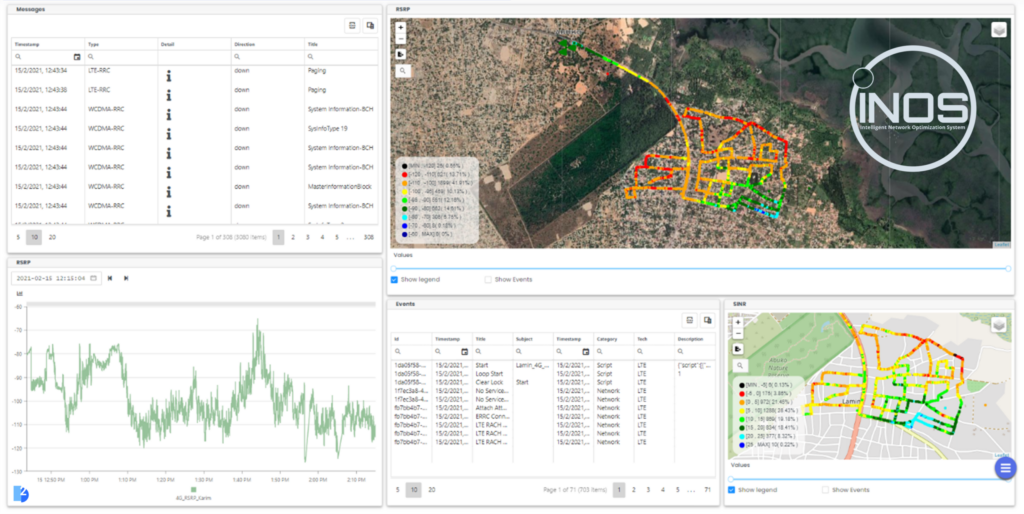
“INOS’ AI-capabilities ensure that analysis of vast amounts of data is completed very rapidly – within 15 minutes of uploading data – so we were able to assess the results, implement fixes and re-run the tests very swiftly.”
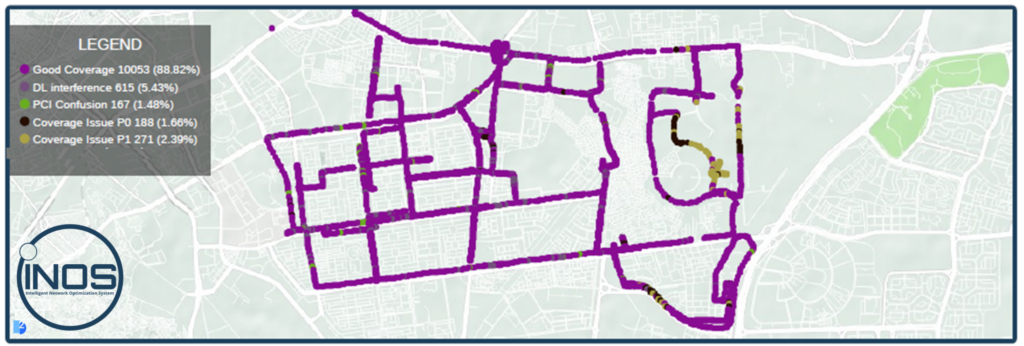
Comprehensive pre-launch testing to optimise for post-launch excellence
“INOS was a vital tool for us in the pre-launch field optimization activities for Africell Angola, to ensure best network coverage and performance, and excellent user experience after launch. INOS helped to speed up the field optimization process for all Luanda clusters, and complete the work in advance of the scheduled launch date.”
INOS & Intel
“INOS was a vital tool for us in the pre-launch field optimization activities for Africell Angola, to ensure best network coverage and performance, and excellent user experience after launch. INOS helped to speed up the field optimization process for all Luanda clusters, and complete the work in advance of the scheduled launch date.”

INOS can be implemented as a public or private cloud, or on-premise solution, and is also available as a “Radio Testing as-a-service” model. Its extensive AI-analysis and remote OTA capabilities ensure speedy and accurate assessment of all aspects of network testing: SSV, in-building and drive testing, network optimisation and competitor benchmarking, across all vendors, network capabilities and technologies, including 5G, private networks and OpenRAN.
INOS is built with compute resources powered by Intel® Xeon® Scalable Processors.
In conversation with Ahmed Ma’moon, Digis Squared’s Key Account Manager for Africell Group.
If you or your team would like to discover more about our capabilities, please get in touch: use this link or email sales@DigisSquared.com .
Discover more
- INOS Product update: “Radio Testing as a Service” – successful cloud-based INOS installation in Intel Lab
- INOS uses Intel® Xeon® Scalable Processors| Digis Squared awarded Intel Winner’s Circle Membership
- INOS: Intel case study | Video & TCP optimisation for Tier 1 MNO
- INOS: In-building coverage testing without an engineer on-site
- INOS solution details
Digis Squared, independent telecoms expertise.
Image credits: all images, Digis Squared
Product update: cognitive tools “OpenRAN Ready”
Ahead of MWC22, Digis Squared’s CTO, Abdelrahman Fady, shares insights into ongoing development work on the Digis Squared suite of cognitive network testing and optimisation solutions, and declares tools “OpenRAN Ready”.
“The development teams in our Technology Centres in Cairo and London have been very busy enhancing the existing suite of cognitive tools to ensure that they are “OpenRAN Ready”. In advance of MWC next week, I’m really happy to share some of the key updates underway,” stated Abdelrahman.
Digis-One: technology and vendor agnostic Unified Fault Management
- Can now connect with the big four legacy vendors and main OpenRAN vendors
- Unifying all alarms from across all network systems and vendors into a single screen
- OpenRAN solutions seamlessly integrated to a single view on one screen
iPM: intelligent technology and vendor agnostic network performance management platform
- Able to connect to legacy vendors in addition to main OpenRAN vendors, and integrate their different performance files into a single unified database
- Unify and visualize all these KPIs into a single coherent view on one screen, and represent them geographically
- Single touch comparison between legacy vendors and OpenRAN vendors performance
INOS: technology and vendor agnostic intelligent network field testing and optimisation solution
- New INOS OpenRAN testing and analytics module launched to easily identify gaps and differences in performance, L3 & L2 messages content and formats, network throughputs, and measure quality between OpenRAN and Legacy RAN sites
- Forecasting of vulnerable areas after OpenRAN deployment
- Automated acceptance report for new Open RAN sites
“If you want to learn about our new “OpenRAN Ready” cognitive network optimisation solution capabilities,” said Abdelrahman, “I will be pleased to meet with you in Barcelona next week, please get in touch!”
If you or your team would like to discover more about our capabilities, please get in touch: use this link or email sales@DigisSquared.com .

Addendum, 22 February 2022
LinkedIn ◦ Following Digis Squared’s earlier “OpenRAN Ready” solution announcement, Hazem Amiry, Regional Sales & Business Development Manager, shared that, “We’ve been working for some time now on an OpenRAN PoC with a very large operator in the Middle East, as the lead contractor on a project with a multi-awarding winning software-enabled OpenRAN solution provider. This project is enabling the team to learn first-hand the benefits of OpenRAN deployment, and ensure we are able to fully optimise our suite of cognitive tools to real-life, complex deployment issues efficiently.”
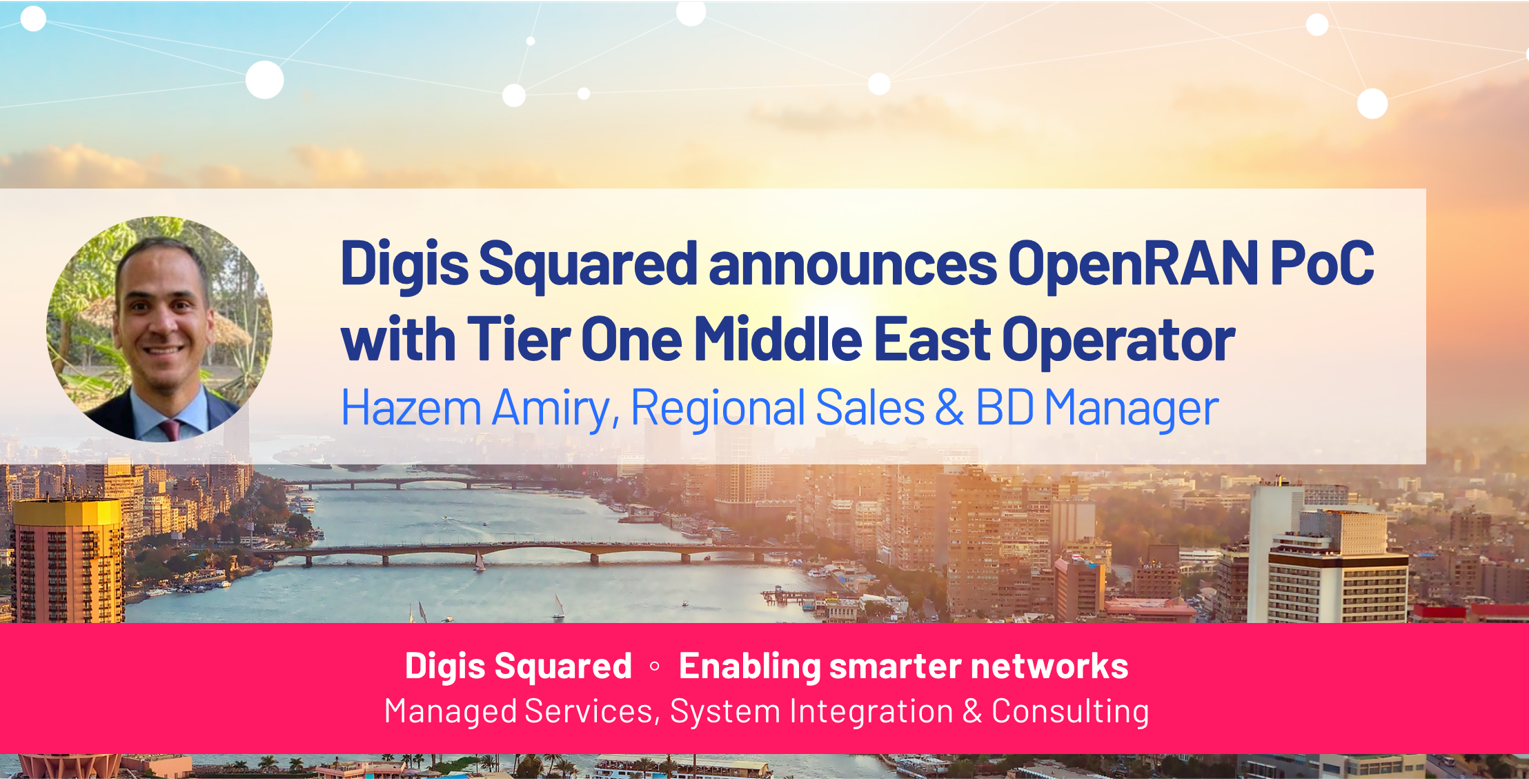
Discover more
- Product update: successful cloud-based INOS testing in Intel Lab, enables Radio Testing as a Service
- INOS: In-building coverage testing without an engineer on-site
- INOS solution details
- CTO insights into Open RAN features and vendor flexibility
- Digis Squared Open RAN projects and capabilities
- Digis Squared at MWC22
Digis Squared, independent telecoms expertise.
Product update: “Radio Testing as a Service” – successful cloud-based INOS installation in Intel Lab
Digis Squared’s team complete INOS migration from local on-premises deployment to first cloud-based installation enabling “Radio Testing as a Service”, with Intel® Xeon® Gold 6338N Processor, in the Intel Lab.
Thanks to membership of Intel Network Builders, work undertaken in the Intel Lab has enabled the Digis Squared team to run INOS over the Intel® Xeon® Gold 6338N processor, in the first cloud-based installation of INOS. This work is the first step in our assessment of INOS as a cloud-based solution with Intel processors. Further work is planned with the Intel Lab team assessing other enhanced processors and benchmarking performance enhancement.
Yasser Elsabrouty, Digis Squared Chief Business Officer and Co-Founder said, “Thanks to Intel Network Builders and membership of Intel Winners Circle, INOS is now providing Radio Testing automation over the cloud, enabling “Radio Testing as a Service” over private or public cloud. The cognitive testing tool can seamlessly manage large amounts of data in a multi-tenant environment, providing full automation and real-time reporting.”
“Delivering INOS Testing as a Service over the cloud will increase efficiency, convenience and scalability, delivering the instant capability to run thousands of radio network tests from anywhere, anytime, in combination with smart automation, real-time reports and KPI deviation alerts. Digis Squared’s cognitive INOS tool just became a whole lot smarter!”
Intel® Xeon® Gold 6338N processor
- 3rd Generation Intel® Xeon® Scalable Processors (formerly “Ice Lake”)
- 10nm technology, 32 cores, 64 threads, 3.6GHx max turbo frequency, full specification.
Benefits & observations
Running 25 INOS Radio Field Tests in the Intel Lab, the following enhancements were measured, and benefits observed,
1. Increased cores & threads
- The Intel® Xeon® Gold 6338N processor enabled Digis Squared to setup 2 or more parallel INOS containers serving two (o more) different customer accounts. In the field, this extra capability enabled by the Intel® Xeon® Gold 6338N processor would mean that,
- More copies of INOS modules can run together in parallel, providing higher processing capability
- Lower response time and faster handling for APIs and web requests
- Duplicating INOS running modules presents high availability
- When assessing response time across all 25 tests, the results show that the Intel® Xeon® Gold 6338N easily handles the volume of data as data payload increases x2.5 over the 25 tests.
2. Max Turbo Frequency: the INOS platform receives high traffic bursts periodically, due to the nature of telecoms. The increased max turbo frequency of the Intel Xeon processor empowers INOS to handle these bursts without any probability of outage.
3. Intel® Turbo Boost Technology 2.0 Frequency: Increases the capability of INOS to receive big sudden bursts of requests, keeping stable progress and high performance (i.e. no delay on data retrieval, no delay on rendering data to maps and tables, and reduced time to prepare reports.)
4. Number of UPI links: INOS consumes a huge volume of processor capability and RAM. To optimise INOS performance, we are looking not just for capacity of the processor, but also how this processor chip interconnects with the rest of the system components. The Intel® Xeon® Gold 6338N presents better integration with various I/O devices reflecting in INOS performance, especially when handling large bursts of input data files.
5. Max memory size: For INOS, more memory means more concurrent users, more software threads running in parallel, and an increase in the number of docker containers running simultaneously. The increased max memory size indicated in this table will deliver at least three or more times the number of INOS containers when using the Intel® Xeon® Gold 6338N.
6. Intel® AES-NI & Intel® Trusted Execution Technology: INOS SW runs on sensitive client data, and this capability will save data from any corruption and violation trials.
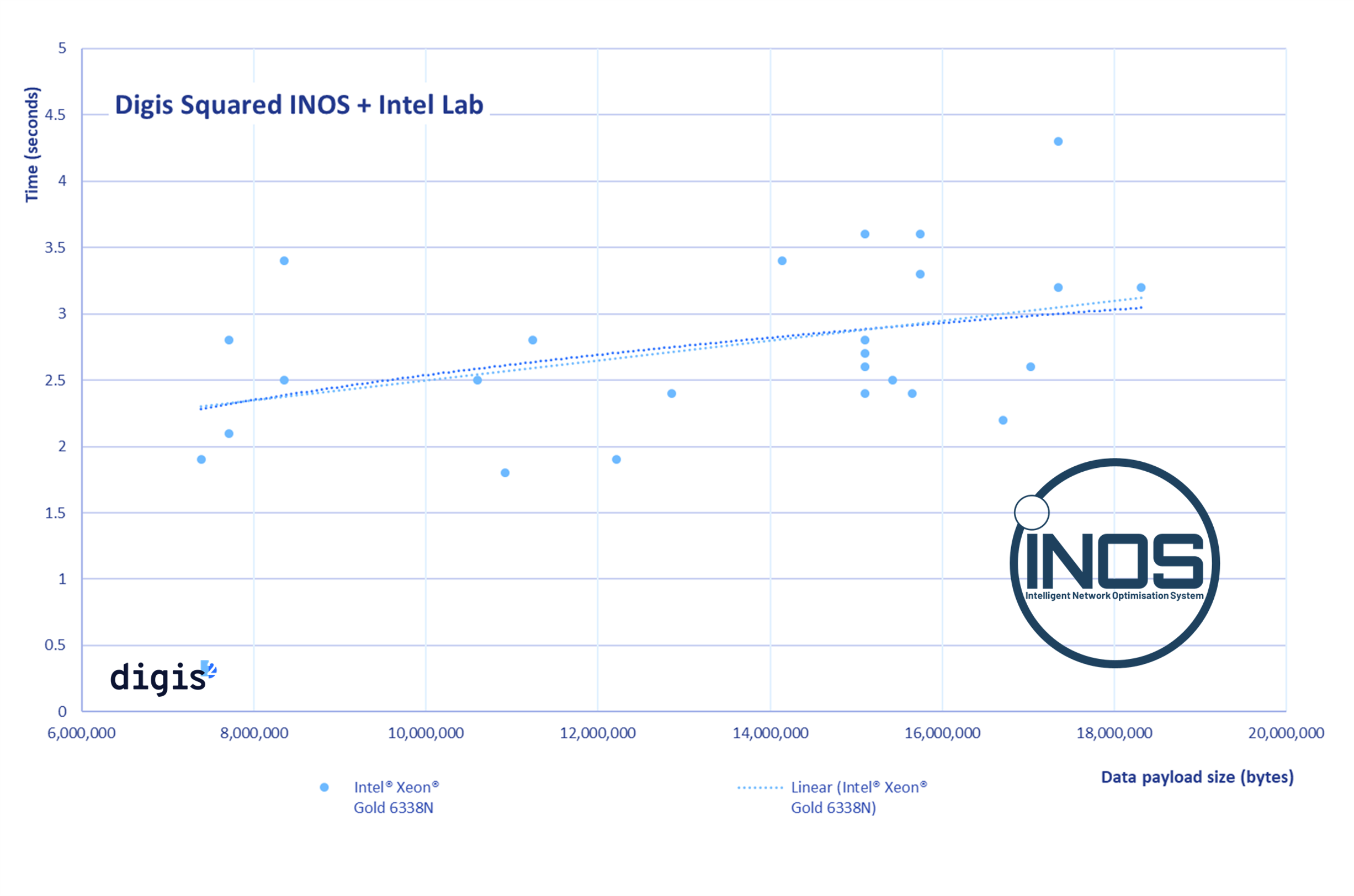
Conclusions & next steps
Having successfully completed this first assessment with the Intel Lab, the Digis Squared team are confident in the deployment of INOS as a cloud-based solution utilising Intel® Xeon® Gold processors, delivering optimised performance and enhanced speeds.
Yasser concluded, “Further work is planned with the Intel Lab team assessing other enhanced processors and measuring performance enhancement, and then, mutual testing with Open RAN market leaders!”
If you or your team would like to discover more about our capabilities, please get in touch: use this link or email sales@DigisSquared.com .
Discover more
- INOS uses Intel® Xeon® Scalable Processors | Digis Squared awarded Intel Winner’s Circle Membership
- INOS: Intel case study | Video & TCP optimisation for Tier 1 MNO
- INOS: In-building coverage testing without an engineer on-site
- INOS & LTE 600MHz: Network benchmarking & optimisation with INOS
- INOS & 5G: now with 5G & multi-vendor chipset support
- INOS & Africell: Africell selects Digis Squared to support new network in Angola
- Test and optimise LTE 450MHz, without handsets
- INOS & Regulators | Now more than ever, use independent tools and expertise
- INOS solution details
Digis Squared, independent telecoms expertise.
AI enhancement of capacity management in mobile networks
The optimisation of capacity management in mobile networks is vital: too little capacity constraints revenue opportunities and impacts customer experience, but idle capacity risks high opex and under-performing investment in assets. Capacity management has always used mathematical modelling techniques to attempt to find the sweet spot, and optimise opportunities and costs. In the past, such predictions were based on historical data, but now AI enhancement of capacity management changes that. The deployment of network virtualization, 5G and network slicing requires the use of cognitive planning; it is vital that capacity planning models are able to assess a step-change in the volume of data points in real-time or near-real-time.
RAN Automation Architect and Data Scientist at Digis Squared, Obeid Allah Ali, describes how AI, automation and advanced analytics are being deployed to gain even greater network capacity planning efficiencies.
What exactly is machine learning, and why is it important?
Machine Learning (ML) is an application of artificial intelligence (AI) that enables computer programs to learn and improve over time because of their interactions with data.
It automates analytics by making predictions using algorithms that learn repeatedly.
Its easy self-learning technique, rather than rule-based programming, has found widespread use in a variety of contexts.
So, whether it’s making life easier with navigation advice based on predicted traffic behaviour, assessing large amounts of medical data to identify new patterns and links, or warning you about market volatility so you can adjust financial decisions, AI and ML technology has permeated many aspects of our daily lives.
The power of prediction machines
In simplified terms, prediction is the process of filling in the missing information. It takes the information you have, often called ‘data,’ and uses it to generate information you don’t have. Most machine learning algorithms are mathematical models that predict outcomes.
How will machine learning impact businesses?
There are two major ways that forecasts will alter the way businesses operate.
- At low levels, a prediction machine can relieve humans of predictive activities, resulting in cost savings, and for example removing emotional bias.
- A prediction machine could become so accurate and dependable that it alters how a company operates.
How big is the growth in mobile connectivity?
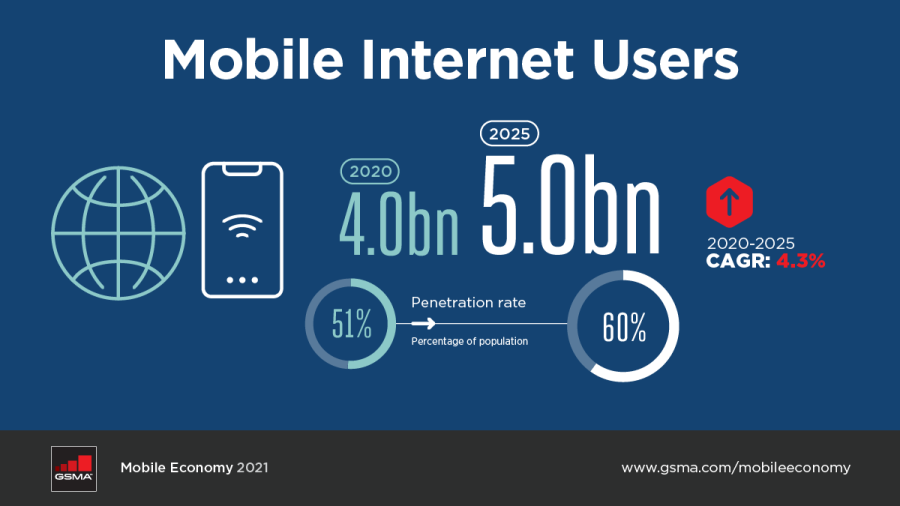
Some further statistics on the growth in mobile data, from the same GSMA report [3],
- global data per user reaching more than 6 GB per month – double the data usage for 2018
- 94% of the world’s population covered by mobile broadband network
- By the end of 2020, 51% of the world’s population – just over 4 billion people – were using mobile internet, an increase of 225 million since the end of 2019
And from [4] GSMA Mobile Economy 2021 report,
- By the end of 2025, 5G will account for just over a fifth of total mobile connections.
Capacity and performance of mobile networks
The rapid growth of mobile traffic places enormous strain on mobile networks’ ability to provide the necessary capacity and performance.
To meet demand, communications services providers (CSPs), mobile network operators and their suppliers need a range of options, including more spectrum, new technology, small cells, and traffic offloading to alternate access networks.
To meet commercial business objectives, mobile network operators are under pressure to maximize the utilization of existing resources while avoiding capacity bottlenecks that reduce revenues and negatively influence end-user experience.
Additionally, network operators have to assess risk, contractual SLAs (especially in the context of MVNOS who utilise their network, and corporate contracts), the total cost of ownership, and the impact on customer experience, perception and brand.
Radio Access Network costs are estimated to be 20% of the opex cost of running a network [1]. And the impact of opex on network quality correlates strongly with increased ARPU and reduced churn; when network quality is highest, service providers benefit from a higher average ARPU (+31 %) and lower average churn (-27%) [2].
Finding the perfect balance of capacity, quality, efficiency and cost – not too much, not too little – is complex and dynamic.
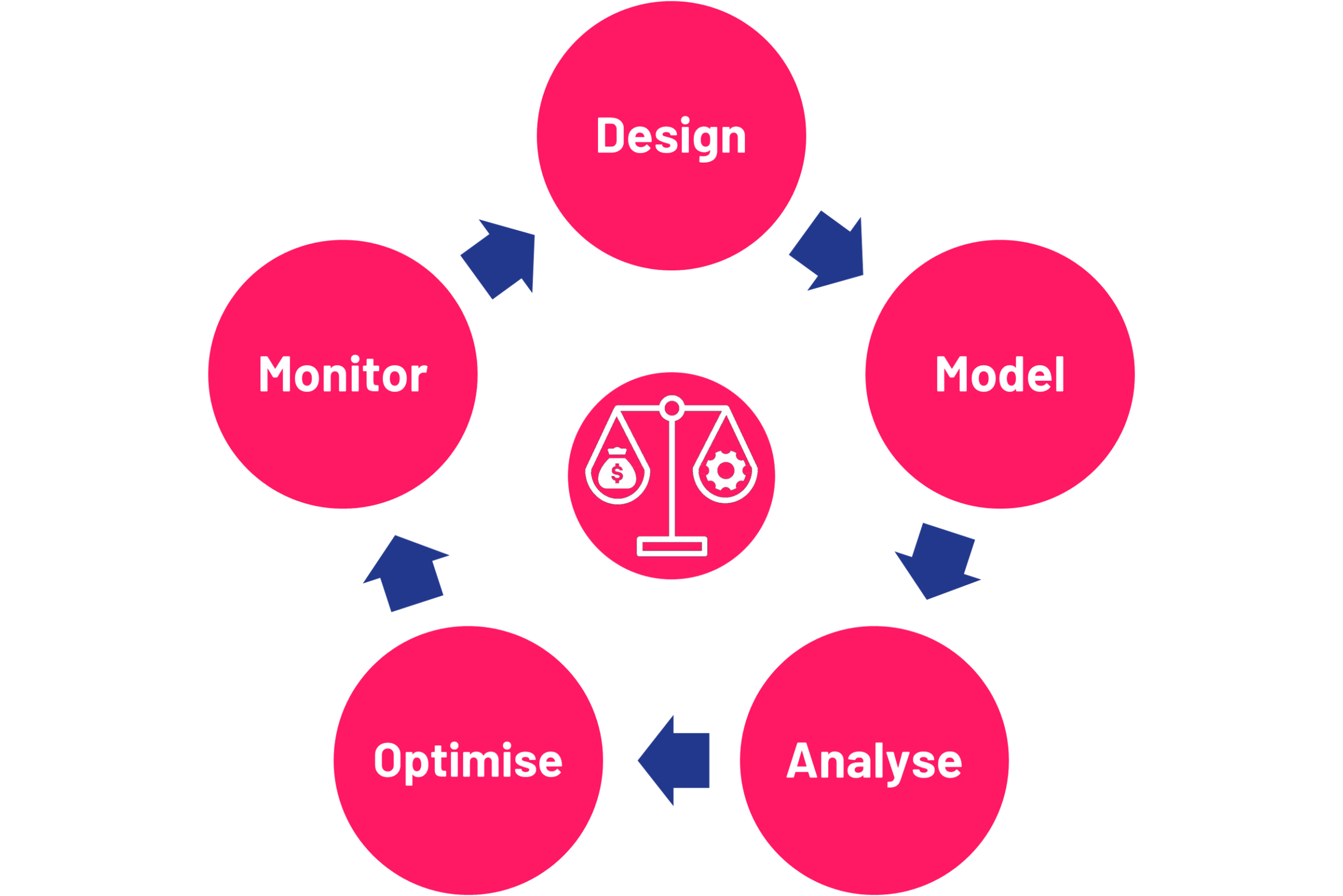
Capacity forecasting for mobile networks
The Digis Squared team have developed machine learning algorithms and decoders that can, based on network activity, decode how User Traffic Profiles are changing. With the deployment of 5G and network slicing techniques, modelling network usage patterns and customer behaviour and predicting future demand becomes immediately far more complex – the only way to successfully model this will be with AI.
Detecting a problem
We detect anomalies in cells in the existing network, plus highly utilized cells, using machine learning and a design approach algorithm based on several reported KPIs. We use this information to distinguish what requires immediate attention from what should be monitored for proactive action. Using multivariable modeling techniques, that is, assessing multiple KPIs across each cell, enables us to have a highly nuanced model, optimising all available capacity.
Forecasting
Operators must be able to estimate the required traffic capacity for their mobile networks in this competitive climate to invest in extensions when they are truly needed, and deploy the most cost-effective solution, while maximizing investment and maintaining good network quality.
In this phase of the development of the model, we will discover future troublesome cells to guide our approach and actions using predictive models.
AI enhancement of capacity management: what’s next?
Today, we use an open-loop control system to apply our AI methods. However, as predictive model accuracy improves, we anticipate transitioning to a fully automated Self-Organized Network (SON) – enabling closed-loop network management with self-planning, self-configuration, self-optimization, and self-healing – system in the near future.
In conversation with Obeid Allah Ali, RAN Automation Architect and Data Scientist at Digis Squared.
If you or your team would like to discover more about our capabilities, please get in touch: use this link or email sales@DigisSquared.com .
Discover more
Digis Squared, independent telecoms expertise.
References
Differentiation through operational excellence
Differentiation through operational excellence. ◦ Ahmed Zein, Digis Squared Co-Founder and Chief Operations & Delivery Officer, shares his experience and thoughts on the vital role the Operations function plays in differentiating your business. Plus, as his new Managed Services team gets ready for the commercial launch of a network, he shares insights into key areas of current focus.
Differentiation and success
What differentiates leading organizations from their less successful rivals? More often than not, it comes down to how they manage their Operations. No matter how great the business strategy, or how large the investment, the Operations Team, the efficiency and customer experience they can achieve, can ultimately determine which business wins and who is left behind.
A workplace philosophy where problem-solving, teamwork, and leadership are core to the way people work together and collaborate, results in the continuous improvement of an organization,” shared Ahmed. “Focusing consistently on the customers’ needs, keeping employees positive and empowered, and continually improving the current activities in the workplace to deliver a better outcome in the future – all of this requires energy and commitment. However, this is a virtuous circle of improvement – keep doing it, and you’ll keep improving, the more energy and commitment you put in, the bigger the improvement you’ll get out.
There are five key areas I’ll be focussing on with the Digis Squared team during this phase. Working together, the team in the Digis Squared Delivery and Operations Centre in Luanda, backed up with staff in our Technology and Customer Support Centre in Cairo, will ensure an on-schedule, optimised network launch, and maintain smooth operational performance throughout.
One: Preparing the Squad
As with any project we work on, preparing the squad for this mission is our top priority. Designing a complete program, and establishing a high achieving attitude and sports-behaviour in the team and its structure, help us all to succeed. The squad needs a dynamic attitude to problem-solving, and an ambitious target to achieve success together.
With all our projects, we carefully consider the specific skills, experience and expertise we need. In recruiting the squad it’s also critical to our success together that we have a strong and aligned sense of purpose, and a strong fit with the Digis Squared culture and sports-team ethos. It’s vitally important to the way in which we operate that we work together as a squad – we help each other, we share knowledge, we learn from and help each other. It’s about both leadership and personal accountability, as well as knowledge sharing. In an area as complex as network technology, almost all issues can only be solved by working together, asking questions, and listening to the experience and ideas of others. We achieve and learn more together.
And this is one of the key differences between Operational Efficiency and Operational Excellence. Efficiency focuses only on how things are done, and doing them better – faster, cheaper, fewer errors, continuous improvement. These are the basics. But Operational Excellence is far wider, it aims to create a culture within the team and company that is conducive to efficient and sustainable long-term growth. The strongly aligned sense of purpose, solving problems and succeeding together as a squad, that is vital to achieving Operational Excellence.

Two: Multi-Vendor Management
Vendor management is not as simple as monitoring a mathematical set of KPIs, and a lengthy document filled with SLA words. As a team, we know that the success of any operations is reliant on sound relationships, and clear communications. The Digis Squared way is to always try and bridge the gaps in understanding, to clarify discussions, to identify a mis-fit in technologies, or a gap within a contract and resolve misunderstandings before they become problematic – and critically, to propose a solution.
Yes, of course we report on KPIs, and when an SLA isn’t being hit, but we also work hard to bridge that gap between the vendor and the operator. We work hard to build connections with the vendor’s teams, and work collaboratively together, running user acceptance tests and handovers across all domains.
Three: Performance & Field Management through NOC
Digis Squared’s Managed Services will ensure we achieve full monitoring of the network, corrective and preventive maintenance, network configuration and change management. All of this will be accomplished with operational excellence strategies by improving network availability, maintaining all network KPIs, enhancing quality of service to end customers, improving customer experience and reducing operating cost, as well as capitalizing on network automation and automating all automatable network procedures, across both front and back-office activities.
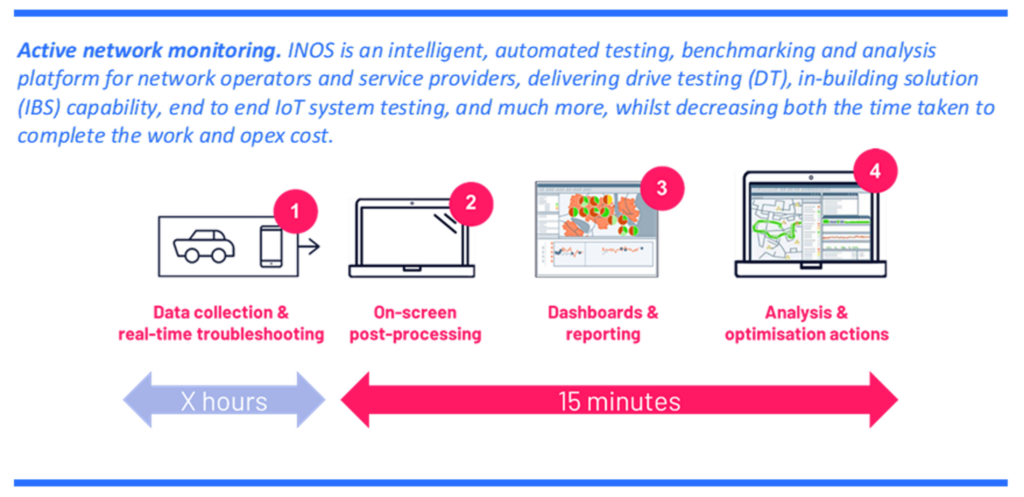
One of the most important KPIs in Managed Services contracts is the focus on Network Performance KPIs as one of the most important goals. Digis Squared’s cognitive tools are used to provide active monitoring of the network. We use INOS for drive testing, and there are plenty of recent blogs about that! [See list at end of blog.]
Digis-One is a key tool for any Operations team. We typically passively monitor the network performance using Digis-One, our cognitive, multi-vendor, multi-technology Unified Fault Management (UFM) solution delivering centralized dashboard and alarming monitoring system for the Front and Back Office Teams. Digis-One facilitates all systems/interfaces monitoring, in addition to automating the most time-critical manual work, including automated generation and assignment of Trouble Tickets to the team responsible for solving the network issue. Digis-One delivers a significant impact on SLAs and Mean Time to Repair.
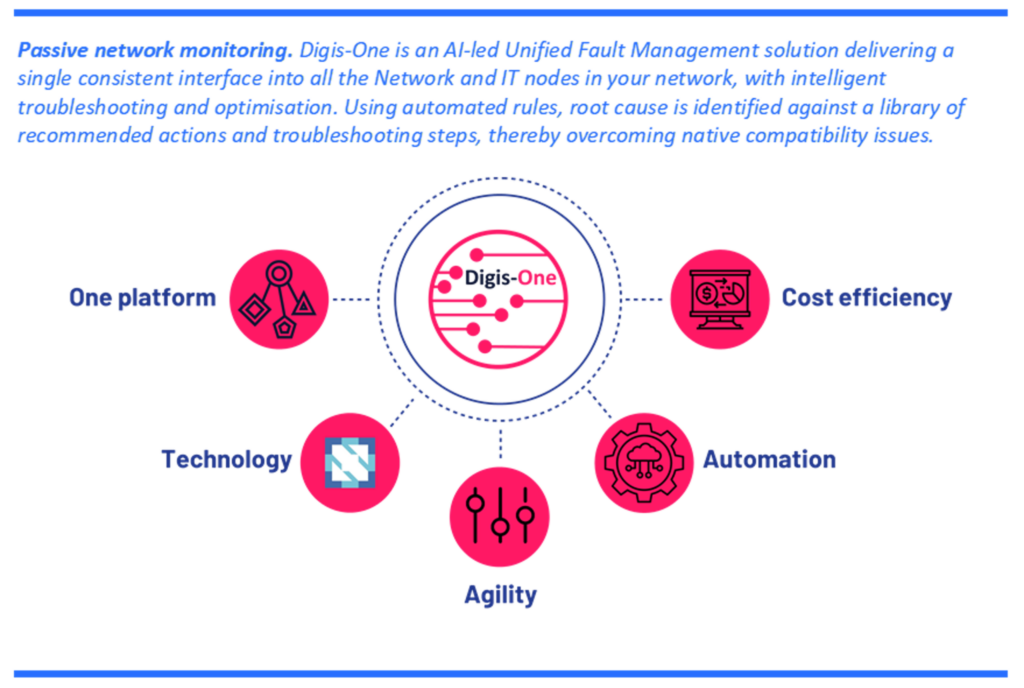
Generally, when undertaking a Managed Services contract, field maintenance is one of the top priorities. Responsive teams on the ground undertake corrective and preventive actions across the network, fixing issues before they become a problem. The Operations Squad assess KPIs, and proactively lead the way to ensuring improved customer experience. Working together, this delivers efficiency, expansion and business success.
The field maintenance service will utilise available data (network, environment, events etc.) and our cognitive tools to schedule preventive maintenance plans and optimise resource utilisation. Mindful of the various contractual SLAs and targets, together, I field maintenance and NOC teams will ensure complete coordination and alignment for all field and site access activities.
Four: Clear Change Management
A newly launched network encounters a lot of dynamic changes and interactions across all domains. I’ve experienced the dynamic situations new network deployments encounter many times before, and know that creative thinking, sound analytical practices and strong teamwork can together solve the issues which will arise. Actively managing and considering the sequence of changes require deep consideration and experience. Careful planning is needed to consider how unforeseen risks or incidents will be handled, what processes will be followed, and how unplanned changes will be addressed.
We’re at a really exciting stage of this project. Combining the skills, expertise and experience of our staff, and our AI-led tools and processes, we’re confident the squad we are building will deliver differentiation through operational excellence.
Five: Application Development Management
As a greenfield mobile network, benefits from the high demands and expectations of the commercial teams to launch ambitious, state of the art products & services to the market, pushing at the competitive and technological edge of possibilities.
With this in mind, the Digis Squared team believe it is important to bring the concept of Application Development Management, ADM, with a DevOps flavour to this Managed Service contract. Merging the development and IT/BSS operations, the goal of our ADM team is to reduce the time between a system needed development or change and its deployment into the production environments. In turn, this reflects on and enhances the time to market to materialize a commercial requirement into a real technical output, deployed on the product IT/VAS nodes. To put that another way, we’ll be using ADM techniques to develop, test and deploy rapid, noticeable improvements in an ongoing continuous loop, perhaps even before the end customer notices there was ever an issue.
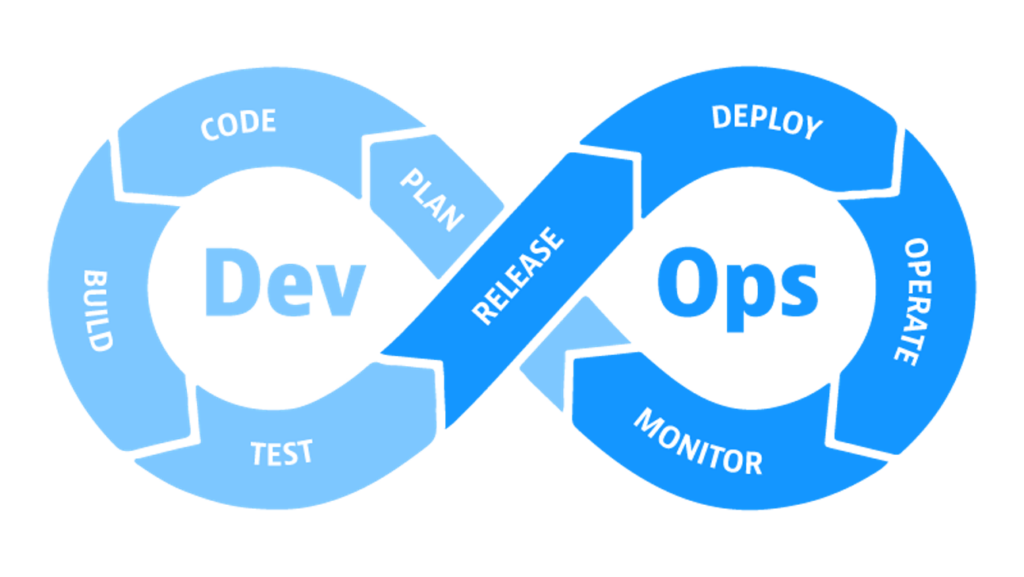
Working in this way, as a DevOps team, both the development staff, and the staff in charge of operations, are in deep communication with each other – they are ONE team! There is enhanced cross-knowledge and collaboration between the developers and IT operations, assessing and solving issues together, and a more seamless workflow that eliminates sizeable knowledge silo’s which are found in traditional models. The result is the smooth deployment of technology, such as software and updates in the safest, most reliable way possible.
Differentiation through operational excellence
It’s an exciting time for the Digis Squared team globally, and we’re ready for this. It’s great to work with clients with clear ambitions, and high targets for excellence. Sharing knowledge, ensuring utilisation of cognitive systems and clear processes, building a superb team. We’re working closely with our client and the other partners to ensure this new network achieves commercial success, and one of the secrets in how we will achieve that together is with differentiation through operational excellence.
In conversation with Ahmed Zein, Digis Squared Co-Founder and Chief Operations & Delivery Officer.
If you or your team would like to discover more about our capabilities, please get in touch: use this link or email sales@DigisSquared.com .
Digis Squared, independent telecoms expertise.
Discover more
- Portfolio: Digis-One • unified fault management
- Blog: Digis-One | Unified Fault Management for multi-vendor, multi-technology networks
- Portfolio: INOS solution details
- Blog: INOS | In-building coverage testing without an engineer on-site
- Blog: INOS & LTE 600MHz: Network benchmarking & optimisation with INOS
- Blog: INOS & 5G | now with 5G & multi-vendor chipset support
- Blog: Test and optimise LTE 450MHz, without handsets
- Blog: INOS & Regulators | Now more than ever, use independent tools and expertise
- Blog: INOS & Africell | Africell selects Digis Squared to support new network in Angola
- Blog: Optimising Africell mobile networks during Covid-19
- Blog: Intel case study | Video & TCP optimisation for Tier 1 MNO, also on Intel blog
- INOS uses Intel® Xeon® Scalable Processors | Digis Squared awarded Intel Winner’s Circle Membership
- 8 Characteristics of Great Teams, in Sports and Business, Warren Strugatch
Image credits
- Digis Squared social media and blog banner image: Fabian Plock (Shutterstock)
- Luanda bay in article: Manual Carreia COSTALOPES
In-building coverage testing without an engineer on-site, with INOS
With an ever-growing volume of wireless network traffic produced inside buildings, network design and performance must be evaluated from within buildings. In this blog post, we assess the growing need for indoor coverage and the impact of the pandemic, plus Digis Squared RAN and Software Solution Architect and Trainer, Amr Ashraf, describes how in-building coverage testing without an engineer on-site can be undertaken, with INOS.
The ever-growing importance of in-building coverage
Often quoted research (1) estimated that “approximately 80 percent of wireless data traffic originates or terminates within a building”. Anecdotally, that figure is far higher now. Lockdowns and work-at-home mandates of the Covid-19 pandemic, plus the growing need to digitally maintain contact with friends and family are sure to have driven this even higher.
The pandemic has generated, and increased, specific needs for wireless connectivity indoors,
• Switch to working at home
• Increase in voice traffic and video conferencing/communication, gaming and streaming traffic as we stay connected online at home to friends and family
• Apps handling proximity detection/tracking and alerts about infected contacts
• Tele-medicine: urgent care assessments and consultations, updating families unable to visit, remote assessments and advice, maintaining safe care-homes for the elderly and hospice patients
Even aside from the pandemic, the explosion in social media and mobile-centric content generation and consumption has dramatically increased the volume of mobile data consumed indoors.
But if indoor coverage is poor, then this impacts both operator revenue, and, perhaps more critically, brand loyalty and churn, as the need to connect now, indoors is far higher than any remaining loyalty consumers (and businesses) have for an operator’s brand.
Testing wireless connectivity inside buildings
Digis Squared RAN and Software Solution Architect and Trainer Amr Ashraf shares insights into the challenges and solutions for testing indoor coverage.
“Indoor network testing presents its own set of challenges, not encountered when undertaking traditional outdoor drive-testing. These indoor challenges include everything from gaining physical access to the site, to collecting as much relevant benchmarking data as possible in a single pass, and determining whether solutions provide data uploads to the cloud and data processing in a timeframe that enables a technician to test and troubleshoot network issues in one visit – if there is poor network coverage indoors, this may impact the speed at which we can assess the results!”
“Indoor testing today utilises smartphone and tablet applications, with all equipment packed discretely into a backpack-based test solution for indoor network testing. This approach has led to the number of walk-testing options for interior settings significantly expanding in recent years. Then, with detailed plans or architecture drawings of the building, and an efficient walking route planned out, a team member can be tasked with wearing the back-pack, starting the app, and walking through the route.”
“As mobile network operators and communications service providers have concentrated more and more on in-building coverage, they often encounter a problem: they are unable to gather all the measurements they need in a single test walk.”
“Critically, it’s no longer necessary for the person walking the route inside the building to be an engineer. The technical assessment can be undertaken by skilled staff, remotely, ensuring your scarce engineering resource can be deployed efficiently across many projects. When an issue is detected during the building walk-through, the network can be optimised remotely – and because the INOS testing and analysis takes just 15 minutes from receipt of data, our aim is to ensure that we can re-test and re-walk the improved area as part of a single visit to the building.”
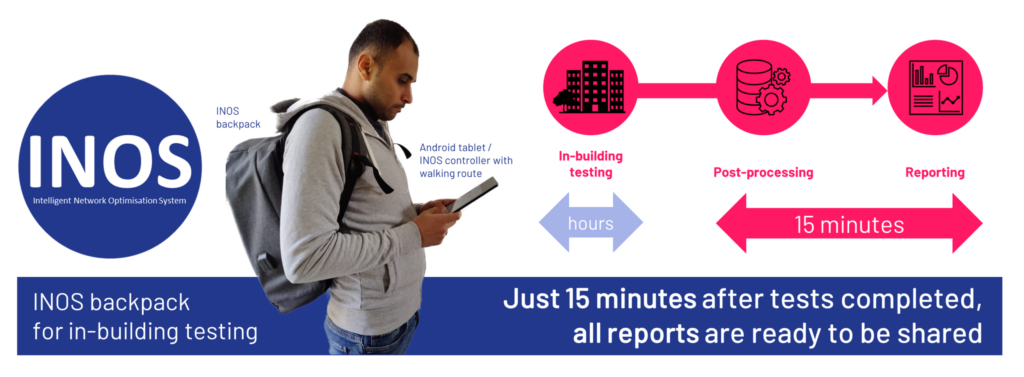
“One of our clients described testing a distributed antenna system at a major convention centre that served four wireless operators using three different wireless technologies across multiple channels, for a total of about 20 different operator/technology/band combinations, each of which required a separate measurement. A complex configuration, but one which is quite common in large business-focused buildings.”
“The indoor network testing for this project was carried out with INOS using the Digis Squared proprietary backpack-based In-Building Test Suite. In contrast to user-equipment-based backpack testing systems, which are typically restricted by the number of devices and technologies that can be tested concurrently, the INOS solution depends on a scanning receiver intended for multi-technology networks. That is to say, we are not constrained, there is no technical limit on the number of devices we can use in the testing.”
Undertaking an in-building survey
“The INOS backpack is a multi-technology integrated solution for testing and measuring multi-device mobile networks. Whether it’s for conducting an indoor or outdoor walk or cycle test, or an outdoor drive test, the INOS backpack offers a small design for portability and simple movement. Data interaction is accomplished by using a WiFi hotspot to link an Android tablet (as a controller unit) to test terminals. A powerful solution for portable multi-network benchmarking, supporting up to 20 test terminals and a scanner for testing and measuring simultaneously.”
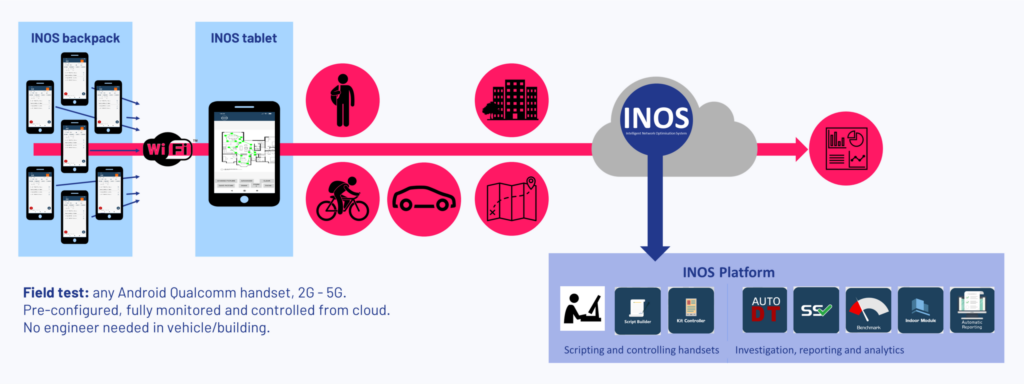
“The measurements are transferred to the cloud for additional data management and processing, and the testing is undertaken according to the test plans given by the controller unit.”
“We use an Android tablet to operate all of the testing equipment in the backpack, connected via Wi-Fi to the test phones, which are also integrated into the backpack. This configuration gives the technician complete control over the devices, enabling them to add pinpoints throughout the in-building walk as data is collected, or repeat sections immediately after dynamic network optimisations are implemented.”
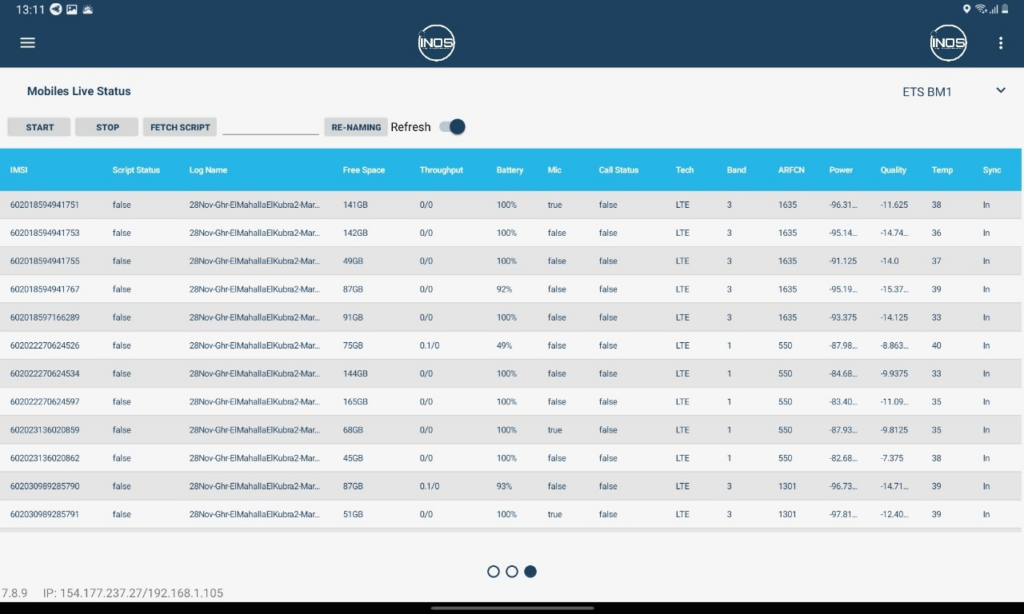
Case study
“Recently, a global Tier One mobile operator used the Digis Squared INOS backpack testing technology to investigate networks in Cairo. They wanted to undertake benchmarking on their own network, as well as those of their main rivals, both inside buildings and outside. Data speeds, latency, and web browsing durations were among the main performance parameters they tested with INOS, as were dropped calls and RSSI signal levels. Once captured, the INOS data collected was sent over the air to the INOS cloud-based platform for immediate automated analysis and presentation via an analytics dashboard.”
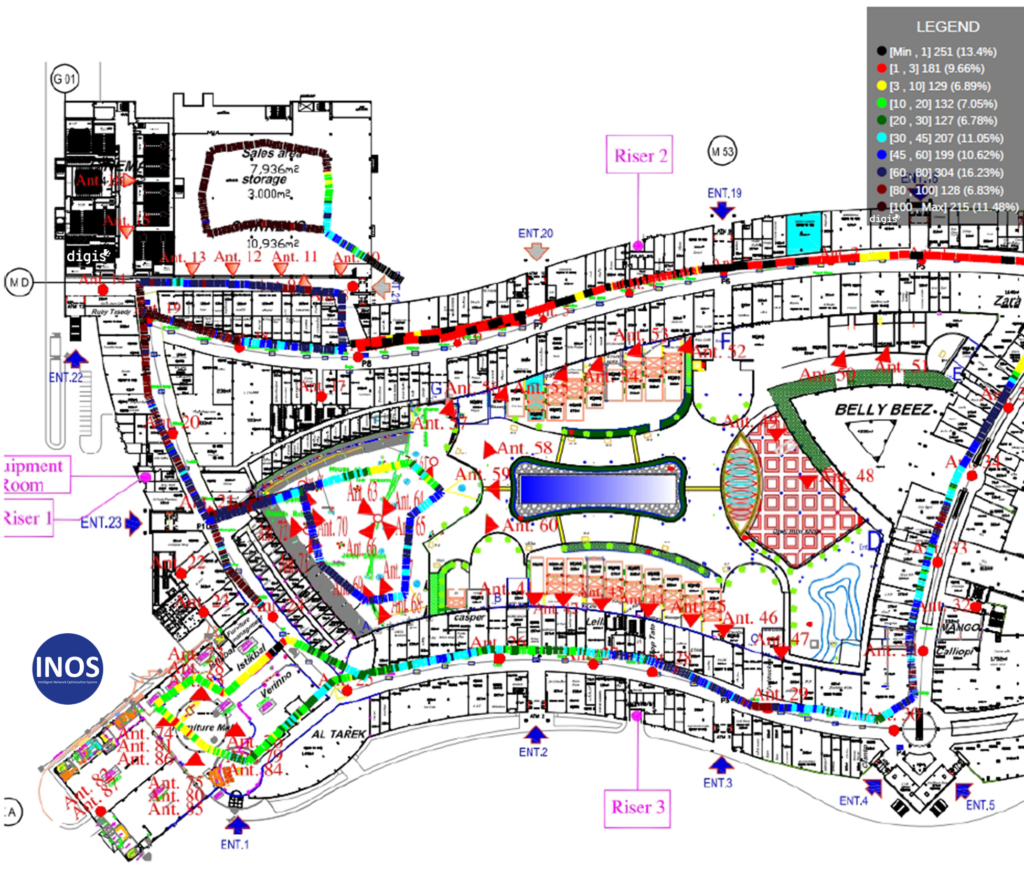
INOS advantage compared with traditional approaches
“One of the primary advantages INOS delivers is our very quick analysis and reporting capability. After just a few minutes of testing, we can practically immediately provide a comprehensive report with all KPIs.”
“The vast majority of network coverage-related complaints occur indoors, traditionally necessitating an engineer to visit the customer’s house or office to undertake a network evaluation – this legacy approach results in high operational costs, and scheduling delays in identifying the issue.”
“Let’s compare that with the INOS solution. Anyone can be tasked with capturing data with INOS, no technical knowledge is needed to carry the backpack around the building or location of interest. It is not necessary to divert a skilled engineer out in to the field to capture data – on some projects we’ve tasked Uber drivers with taking an INOS bag around a pre-defined route, and returning it to us, or asked a member of the admin team to cycle a route with the INOS backpack. The INOS system can even be utilised to submit a self-service complaint to skilled RF optimization specialists in the office, who can then undertake an initial assessment remotely using the INOS kit controller and web application. And of course, as only one person is needed to take the bag in a car, or walk it around a building, the solution is also Covid-19 safe.”
“INOS also enables operators and suppliers to capture data in the field remotely, analyse the data, determine which issues can be solved remotely, and then efficiently schedule and resolve problems which can only be addressed in the field .”
“If you want to know more, we’re always happy to chat through what we can do to help you. Meet us at MWC22 or let’s fix up a call online.”
In conversation with Amr Ashraf, Digis Squared RAN and Software Solution Architect.
If you or your team would like to discover more about our capabilities, please get in touch: use this link or email sales@DigisSquared.com .
Key Advantages of INOS
- Tablet: From the Android picture gallery, users can quickly import tiny to huge floor plans (of any form of structure).
- Floor plans and data are kept in the cloud and may be shared with co-workers.
- Ease of use, testing, and interior navigation can all be undertaken by non-technical personnel.
- In real time, test data is uploaded to the INOS Cloud server.
- Post-analysis: results can be mapped onto indoor floor layout, with a web-based dashboard.
- All-in-one mobile solution with device, network, and service benchmarking capabilities.
- From the standpoint of subscribers, it provides extensive network performance statistics.
- INOS is used as the test device, allowing for a single investment to be used for multiple purposes.
- Test procedures, data processing and analysis can be fully automated, resulting in increased overall efficiency, and optimised consistency.
Discover more
- INOS & LTE 600MHz: Network benchmarking & optimisation with INOS
- INOS & 5G: now with 5G & multi-vendor chipset support
- INOS & Africell: Africell selects Digis Squared to support new network in Angola
- Test and optimise LTE 450MHz, without handsets
- INOS & Regulators | Now more than ever, use independent tools and expertise
- INOS solution details
- INOS uses Intel® Xeon® Scalable Processors | Digis Squared awarded Intel Winner’s Circle Membership
Digis Squared, independent telecoms expertise.
Image credits
- Digis Squared social media and blog banner image: Sung Jin Cho
- With thanks to Digis Squared’s Ziad Mohamed
- All INOS images: (c) Digis Squared
References





